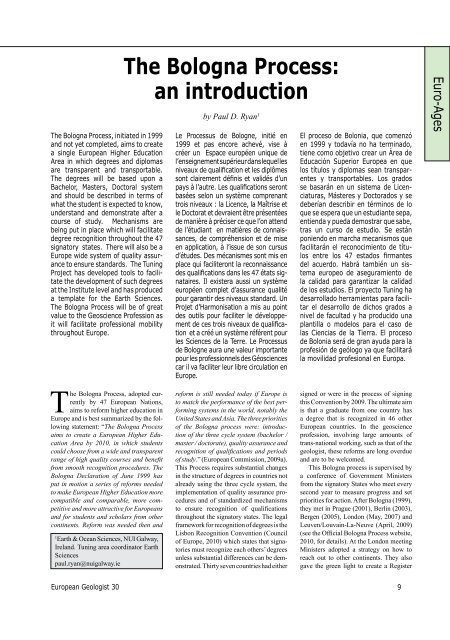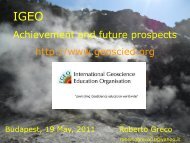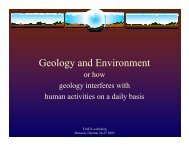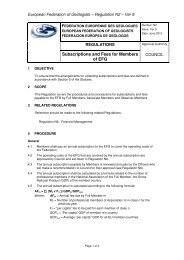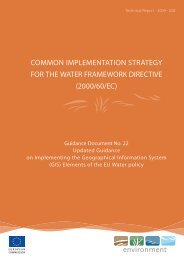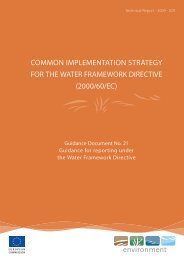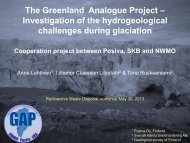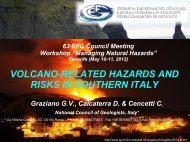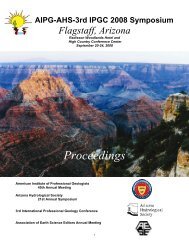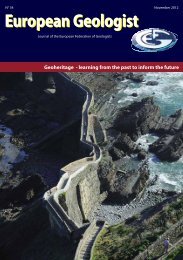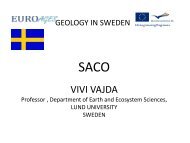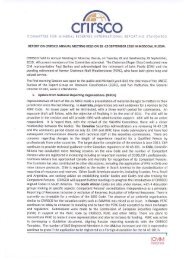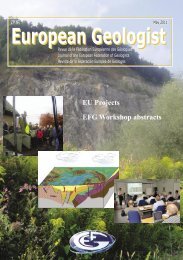Euro-Ages<strong>of</strong> the principles <strong>of</strong> geologyDeeper knowledge <strong>of</strong> a chosen specializationCritical awareness <strong>of</strong> the forefront <strong>of</strong> theirspecializationAdvanced understanding <strong>of</strong> Earth systemrelevant to their specializationAppreciation <strong>of</strong> the learning capacityneeded to progress to independentresearch.Analysis, design and implementationAbility to specify and complete geologicaltasks that are complex, incompletelydefined or unfamiliarSome ability to formulate and solve problemsin new and emerging areas <strong>of</strong> theirdisciplineAbility to apply state-<strong>of</strong>-the-art or innovativemethods in problem solving, possiblyinvolving use <strong>of</strong> other disciplinesAbility to think creatively to develop newand original approaches and methods.Technological, methodological and transferableskillsAbility to design appropriate experiments,to analyze and interpret data and drawconclusions integrating knowledgefrom different disciplines, and handlingcomplexityAbility to use advanced, and develop customized,quantitative methodsComprehensive understanding <strong>of</strong> applicabletechniques and methods for aparticular specialization, and <strong>of</strong> theirlimitsAwareness <strong>of</strong> the limits <strong>of</strong> current knowledgeand the practical application <strong>of</strong> thestate-<strong>of</strong>-the-art technologyKnowledge and understanding <strong>of</strong> geologyto create geological models <strong>of</strong> complexsystems and processesBasic ability to contribute to the furtherdevelopment <strong>of</strong> geology in practice andresearch.Other pr<strong>of</strong>essional competencesAbility to produce independent work intheir pr<strong>of</strong>essional and scientific fieldsAbility to manage and work effectively asa leader <strong>of</strong> teams that may be composed<strong>of</strong> different disciplines and levelsBasic ability to work effectively and communicatein national and internationalcontextsAppreciation <strong>of</strong> the role <strong>of</strong> geology inthe development <strong>of</strong> knowledge, wealthcreation and improving quality <strong>of</strong> lifeAbility to evaluate performance as anindividual and a team memberAbility to identify individual and collectivegoals and responsibilities and to performin a manner appropriate to these rolesAbility to critically evaluate pr<strong>of</strong>essionaland research papersAbility to plan an appropriate programme<strong>of</strong> continuing pr<strong>of</strong>essional development.Further, within the scope <strong>of</strong> the surveys,a state-<strong>of</strong>-the-art report concerning thecurrent status <strong>of</strong> geology in higher educationacross Europe has been developed.Accordingly, the project provided benefitsto departments <strong>of</strong> geology and the academiccommunity by engaging them inthe most important endeavour <strong>of</strong> definingleaning outcomes in geology. Also, in thisprocess, the employment side, companies,and corporate members and further stakeholderswere able to feed in their expectationsabout the qualification pr<strong>of</strong>ile <strong>of</strong>their future employees. The Standards andCriteria are intended to provide a meansfor reviewing the quality <strong>of</strong> higher educationgeology qualifications in the <strong>European</strong>Higher Education Area (EHEA), ina way that encourages the dissemination<strong>of</strong> good practice and a culture <strong>of</strong> continuousimprovement <strong>of</strong> geology programmes.Given the great diversity <strong>of</strong> education ingeology across Europe, the attempt tocreate framework standards comprisingall areas <strong>of</strong> the geology discipline appearsambitious. In the course <strong>of</strong> the projectthe traditional education <strong>of</strong> geologists at<strong>European</strong> universities appeared to be ina transition period. The design <strong>of</strong> studyprogrammes in geology actually driftsto more interdisciplinary and/or specializedfocuses and “classical” geology isinserted in a selective way in new programmesunder different titles. Thereforethe number <strong>of</strong> mere geological study programmesdecreases all over Europe whilstthe interdisciplinary approach focusing on“geosciences” gains strength. Despite thisobservation the project partners decidedto continue the work on sectoral geologyoutcome descriptors as they would alsobe useful for the design, implementationand quality control <strong>of</strong> study programmesfollowing a broader and or more interdisciplinaryand or more specializededucational objective. From this perspectivethe framework descriptors wouldserve as departing point for further amendmentsdescribing competencies also for therelated fields <strong>of</strong> study and the respectiveinterdisciplinary combinations. The Euro-Ages framework is thus intended as a broadcommon denominator, or overarching referencepoint, for the variety <strong>of</strong> geologyprogrammes. In order to allow for possibleinclusion <strong>of</strong> existing geology specializationswithin <strong>European</strong> Higher EducationInstitutions, the framework must beformulated in rather general terms. TheStandards and Criteria represent a qualitythreshold. All graduates <strong>of</strong> programmesassessed against the Euro-Ages standardsare expected to achieve the programmelearning outcomes stated therein. Accreditation<strong>of</strong> a geology degree programme isthe primary result <strong>of</strong> a process used toensure the suitability <strong>of</strong> that programme asproviding the education base for the entryroute to pr<strong>of</strong>essional practice. It involvesa periodic assessment against acceptedstandards <strong>of</strong> higher education in geology.Independent, third-party accreditation isessentially based on a peer review process,undertaken by appropriately trainedand independent teams comprising peersfrom both academia and geology practice,in accordance with agreed principles. It isimportant that accreditation processes gobeyond judgement on the achievement <strong>of</strong>a minimum standard, and effectively promotethe idea <strong>of</strong> continuous improvement<strong>of</strong> the quality <strong>of</strong> higher education programmes.The Standards for Accreditationcan be used in both the design and the evaluation<strong>of</strong> programmes in all specializations<strong>of</strong> geology. They are expressed as broadgeneric programme-learning outcomesthat describe in general terms the capabilitiesrequired <strong>of</strong> graduates from accreditedFirst Cycle and Second Cycle geologyprogrammes, as defined in the Frameworkfor Qualifications <strong>of</strong> the <strong>European</strong> HigherEducation Area. Consequently, they canbe interpreted and elaborated by users toreflect the specific demands <strong>of</strong> differentcycles and specializations.This project has been funded with supportfrom the <strong>European</strong> Commission. Thispublication reflects the views only <strong>of</strong> theauthor, and the Commission cannot be heldresponsible for any use which may be made<strong>of</strong> the information contained therein.8 <strong>European</strong> Geologist <strong>30</strong>
The Bologna Process, initiated in 1999and not yet completed, aims to createa single <strong>European</strong> Higher EducationArea in which degrees and diplomasare transparent and transportable.The degrees will be based upon aBachelor, Masters, Doctoral systemand should be described in terms <strong>of</strong>what the student is expected to know,understand and demonstrate after acourse <strong>of</strong> study. Mechanisms arebeing put in place which will facilitatedegree recognition throughout the 47signatory states. There will also be aEurope wide system <strong>of</strong> quality assuranceto ensure standards. The TuningProject has developed tools to facilitatethe development <strong>of</strong> such degreesat the Institute level and has produceda template for the Earth Sciences.The Bologna Process will be <strong>of</strong> greatvalue to the Geoscience Pr<strong>of</strong>ession asit will facilitate pr<strong>of</strong>essional mobilitythroughout Europe.The Bologna Process:an introductionby Paul D. Ryan 1Le Processus de Bologne, initié en1999 et pas encore achevé, vise àcréer un Espace européen unique del’enseignement supérieur dans lequel lesniveaux de qualification et les diplômessont clairement définis et validés d’unpays à l’autre. Les qualifications serontbasées selon un système comprenanttrois niveaux : la Licence, la Maîtrise etle Doctorat et devraient être présentéesde manière à préciser ce que l’on attendde l’étudiant en matières de connaissances,de compréhension et de miseen application, à l’issue de son cursusd’études. Des mécanismes sont mis enplace qui faciliteront la reconnaissancedes qualifications dans les 47 états signataires.Il existera aussi un systèmeeuropéen complet d’assurance qualitépour garantir des niveaux standard. UnProjet d’Harmonisation a mis au pointdes outils pour faciliter le développementde ces trois niveaux de qualificationet a créé un système référent pourles Sciences de la Terre. Le Processusde Bologne aura une valeur importantepour les pr<strong>of</strong>essionnels des Géosciencescar il va faciliter leur libre circulation enEurope.El proceso de Bolonia, que comenzóen 1999 y todavía no ha terminado,tiene como objetivo crear un Área deEducación Superior Europea en quelos títulos y diplomas sean transparentesy transportables. Los gradosse basarán en un sistema de Licenciaturas,Másteres y Doctorados y sedeberían describir en términos de loque se espera que un estudiante sepa,entienda y pueda demostrar que sabe,tras un curso de estudio. Se estánponiendo en marcha mecanismos quefacilitarán el reconocimiento de títulosentre los 47 estados firmantesdel acuerdo. Habrá también un sistemaeuropeo de aseguramiento dela calidad para garantizar la calidadde los estudios. El proyecto Tuning hadesarrollado herramientas para facilitarel desarrollo de dichos grados anivel de facultad y ha producido unaplantilla o modelos para el caso delas Ciencias de la Tierra. El procesode Bolonia será de gran ayuda para lapr<strong>of</strong>esión de geólogo ya que facilitarála movilidad pr<strong>of</strong>esional en Europa.Euro-AgesThe Bologna Process, adopted currentlyby 47 <strong>European</strong> Nations,aims to reform higher education inEurope and is best summarized by the followingstatement: “The Bologna Processaims to create a <strong>European</strong> Higher EducationArea by 2010, in which studentscould choose from a wide and transparentrange <strong>of</strong> high quality courses and benefitfrom smooth recognition procedures. TheBologna Declaration <strong>of</strong> June 1999 hasput in motion a series <strong>of</strong> reforms neededto make <strong>European</strong> Higher Education morecompatible and comparable, more competitiveand more attractive for <strong>European</strong>sand for students and scholars from othercontinents. Reform was needed then and1Earth & Ocean Sciences, NUI Galway,Ireland. Tuning area coordinator EarthSciencespaul.ryan@nuigalway.iereform is still needed today if Europe isto match the performance <strong>of</strong> the best performingsystems in the world, notably theUnited States and Asia. The three priorities<strong>of</strong> the Bologna process were: introduction<strong>of</strong> the three cycle system (bachelor /master / doctorate), quality assurance andrecognition <strong>of</strong> qualifications and periods<strong>of</strong> study.” (<strong>European</strong> Commission, 2009a).This Process requires substantial changesin the structure <strong>of</strong> degrees in countries notalready using the three cycle system, theimplementation <strong>of</strong> quality assurance proceduresand <strong>of</strong> standardized mechanismsto ensure recognition <strong>of</strong> qualificationsthroughout the signatory states. The legalframework for recognition <strong>of</strong> degrees is theLisbon Recognition Convention (Council<strong>of</strong> Europe, 2010) which states that signatoriesmust recognize each others’ degreesunless substantial differences can be demonstrated.Thirty seven countries had eithersigned or were in the process <strong>of</strong> signingthis Convention by 2009. The ultimate aimis that a graduate from one country hasa degree that is recognized in 46 other<strong>European</strong> countries. In the geosciencepr<strong>of</strong>ession, involving large amounts <strong>of</strong>trans-national working, such as that <strong>of</strong> thegeologist, these reforms are long overdueand are to be welcomed.This Bologna process is supervised bya conference <strong>of</strong> Government Ministersfrom the signatory States who meet everysecond year to measure progress and setpriorities for action. After Bologna (1999),they met in Prague (2001), Berlin (2003),Bergen (2005), London (May, 2007) andLeuven/Louvain-La-Neuve (April, 2009)(see the Official Bologna Process website,2010, for details). At the London meetingMinisters adopted a strategy on how toreach out to other continents. They alsogave the green light to create a Register<strong>European</strong> Geologist <strong>30</strong>9


